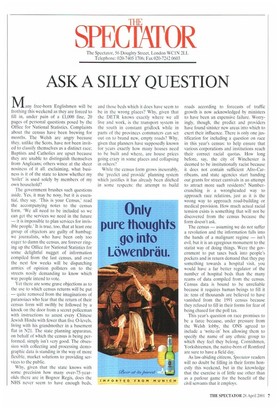ASK A SILLY QUESTION
M any free-born Englishmen will be frothing this weekend as they are forced to fill in, under pain of a £1,000 fine, 20 pages of personal questions posed by the Office for National Statistics. Complaints about the census have been brewing for months. The Welsh are angry because they, unlike the Scots, have not been invited to classify themselves as a distinct race; Baptists and Catholics are upset because they are unable to distinguish themselves from Anglicans; others wince at the sheer nosiness of it all. exclaiming, what business is it of the state to know whether my 'toilet' is used solely by members of my own household?
The government brushes such questions aside. Yes, it may be nosy, but it is essential, they say. This is your Census,' read the accompanying notes to the census form. 'We all need to be included so we can get the services we need in the future — it is impossible to plan services for invisible people.' It is true, too, that at least one group of objectors are guilty of humbug: we journalists, who have been only too eager to damn the census, are forever ringing up the Office for National Statistics for some delightful nugget of information compiled from the last census, and over the next few weeks will be dispatching armies of opinion pollsters on to the streets nosily demanding to know which way people intend to vote.
Yet there are some grave objections as to the use to which census returns will be put — quite removed from the imaginations of paranoiacs who fear that the return of their census form will swiftly be followed by a knock on the door from a secret policeman with instructions to arrest every Chinese Jewish Hindu with fewer than five 0-levels, living with his grandmother in a basement flat in N21. The state planning apparatus, on behalf of which the census is being performed, simply isn't very good. The obsession with collecting and processing demographic data is standing in the way of more flexible, market solutions to providing services to the public.
Why, given that the state knows with some precision how many over-75-yearolds there are in Bognor Regis, does the NHS never seem to have enough beds, and those beds which it does have seem to be in the wrong places? Why, given that the DETR knows exactly where we all live and work, is the transport system in the south in constant gridlock while in parts of the provinces commuters can set out on to brand new, empty roads? Why, given that planners have supposedly known for years exactly how many houses need to be built and where, are house prices going crazy in some places and collapsing in others?
While the census form grows inexorably, the 'predict and provide' planning system which justifies it has already been ditched in some respects: the attempt to build roads according to forecasts of traffic growth is now acknowledged by ministers to have been an expensive failure. Worryingly, though, the predict and providers have found sinister new areas into which to exert their influence. There is only one justification for including a question on race in this year's census: to help ensure that various corporations and institutions reach their correct racial quotas. How long before, say, the city of Winchester is deemed to be institutionally racist because it does not contain sufficient Afro-Carribeans, and state agencies start handing out grants for street carnivals in an attempt to attract more such residents? Numbercrunching is a wrongheaded way to approach race relations, just as it is the wrong way to approach road-building or medical provision. How much actual racial tension exists is something that will not be discovered from the census because the form doesn't ask.
The census — assuming we do not suffer a revolution and the information falls into the hands of a malignant regime — isn't evil, but it is an egregious monument to the statist way of doing things. Were the government to put taxes back into people's pockets and in return demand that they pay something towards a hospital visit, you would have a far better regulator of the number of hospital beds than the many reams of data compiled from the census. Census data is bound to be unreliable because it requires human beings to fill it in: tens of thousands are believed to have vanished from the 1991 census because they refused to fill in their forms for fear of being chased for the poll tax.
This year's question on race promises to be a farce because, under pressure from the Welsh lobby, the ONS agreed to include a 'write-in' box allowing them to specify the name of any ethnic group to which they feel they belong. Cornishmen, Yorkshiremen, the native-born of Romford are sure to have a field day.
As law-abiding citizens, Spectator readers will no doubt be filling in their forms honestly this weekend, but in the knowledge that the exercise is of little use other than as a parlour game for the benefit of the civil servants that it employs.


































































 Previous page
Previous page